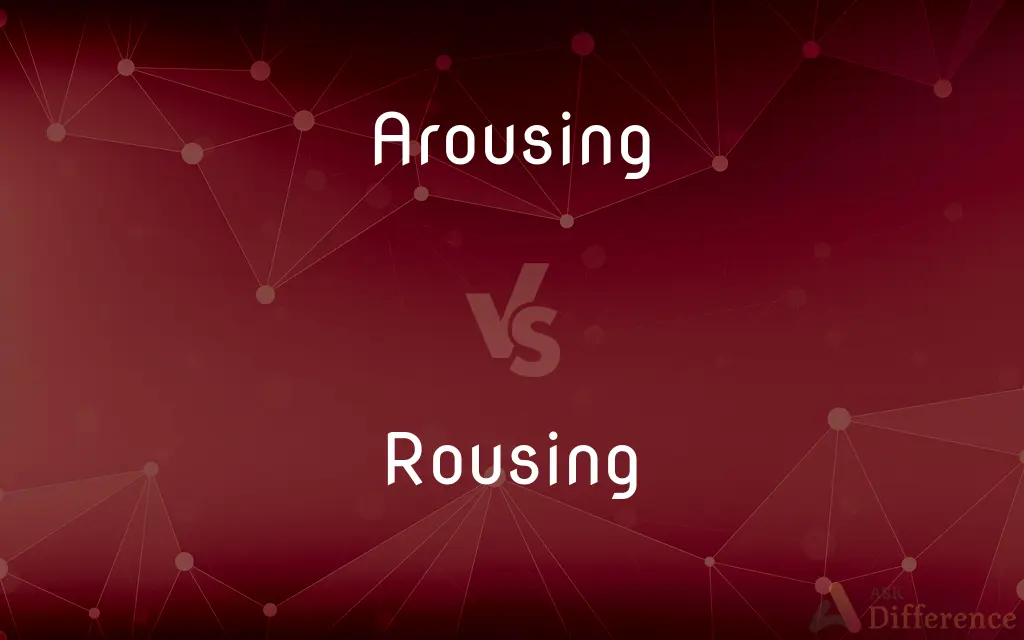Arousing vs. Rousing — What's the Difference?
Edited by Tayyaba Rehman — By Urooj Arif — Updated on April 2, 2024
Arousing incites feelings or desires, often sexual, while rousing stirs to action or emotion.

Difference Between Arousing and Rousing
Table of Contents
ADVERTISEMENT
Key Differences
Arousing is primarily used to describe the stimulation of sexual feelings or desires, but it can also refer to the provocation of other sensations or emotions. Rousing, on the other hand, is more about stirring someone to action or waking them, often used in contexts of excitement, enthusiasm, or motivation. While both terms involve the act of stimulating or activating, arousing often has a connotation linked to physical or emotional desire, whereas rousing is more associated with energizing or inspiring individuals or groups.
In literature and media, "arousing" is frequently used to describe content that elicits sexual desire or interest. It can also refer to stimulating other senses, such as an "arousing scent" that invokes a strong reaction. "Rousing," however, is commonly used to describe speeches, music, or actions that awaken a sense of passion or urgency, such as a "rousing speech" that motivates listeners to take action.
The difference in usage reflects the different emotional responses the words are intended to elicit. Arousing is often related to personal, intimate reactions, focusing on individual feelings and desires. Rousing, by contrast, tends to be about collective motivation, aiming to inspire a group towards a common goal or feeling, such as unity or excitement.
Marketing and advertising provide clear examples of both terms in action. An "arousing advertisement" might play on sensual imagery or themes to capture interest, targeting individual desires and appetites. A "rousing campaign," however, would aim to energize and mobilize the audience around a product, cause, or idea, emphasizing action and enthusiasm.
The distinction between arousing and rousing also appears in their antonyms and synonyms. Arousing is often linked with terms like "stimulating" or "provocative," especially in a sexual context, whereas rousing is associated with "invigorating" or "inspiring." Similarly, while the opposite of arousing might be "dulling" or "quelling," the antonym of rousing could be "demotivating" or "disheartening."
ADVERTISEMENT
Comparison Chart
Definition
Inciting sexual feelings or desires; provoking a strong emotional or sensory response
Stirring to action, excitement, or wakefulness; inspiring
Common Contexts
Sexual desire, sensory stimulation
Motivation, enthusiasm, action
Examples
Arousing imagery, arousing curiosity
Rousing speech, rousing music
Emotional Focus
Individual desires and sensations
Collective action, motivation, and unity
Synonyms
Stimulating, enticing
Invigorating, inspiring
Compare with Definitions
Arousing
Stimulating sexual desire or interest.
The novel contained several arousing scenes.
Rousing
Stirring to action or effort.
The coach gave a rousing speech that motivated the team.
Arousing
Provoking strong emotions or sensations.
The aroma of the coffee was quite arousing in the morning.
Rousing
Causing excitement or enthusiasm.
The concert ended with a rousing performance.
Arousing
Leading to an increased state of awareness or excitement.
The thunderstorm was arousing a sense of awe.
Rousing
Inciting to strong indignation or anger.
The news article was rousing public outcry.
Arousing
Inciting curiosity or interest.
The mysterious painting was arousing curiosity among the viewers.
Rousing
Inspiring collective emotion or action.
The event was a rousing success, bringing the community together.
Arousing
Evoking a specific reaction or response.
The speech was arousing anger and frustration in the audience.
Rousing
Awakening from sleep or inactivity.
The alarm was rousing her from a deep sleep.
Arousing
To cause (someone) to be active, attentive, or excited
The report aroused them to take action. The insult aroused him to anger.
Rousing
Inducing enthusiasm or excitement; stirring
A rousing sermon.
Arousing
To stimulate sexual desire in.
Rousing
Lively; vigorous
A rousing march tune.
Arousing
To give rise to (a feeling, for example); stir up
The odd sight aroused our curiosity.
Rousing
Used as an intensive
A rousing lie.
Arousing
To awaken (someone) from sleep.
Rousing
That rouses or excites.
Rousing music
Arousing
Present participle of arouse
Rousing
Present participle of rouse
Arousing
Causing arousal.
I am having very arousing thoughts about my gym teacher when he's in his tight shorts.
Rousing
The act by which somebody or something is roused.
Arousing
(rare) An act or occurrence in which something is aroused
Rousing
Having power to awaken or excite; exciting.
I begin to feelSome rousing motions in me.
Rousing
Very great; violent; astounding; as, a rousing fire; a rousing lie.
Rousing
The act of arousing;
The purpose of art is the arousal of emotions
Rousing
Capable of arousing enthusiasm or excitement;
A rousing sermon
Stirring events such as wars and rescues
Rousing
Rousing to activity or heightened action as by spurring or goading;
Tossed a rousing political comment into the conversation
Common Curiosities
Can a speech be both arousing and rousing?
Yes, a speech can be both if it stimulates emotional or sexual feelings (arousing) and motivates or energizes the audience (rousing).
What is the importance of rousing music in movies?
Rousing music is used to elevate the viewer's emotions, often to inspire feelings of excitement, anticipation, or a sense of urgency.
Can a book be arousing without being sexual?
Yes, a book can arouse curiosity, interest, or emotional engagement without involving sexual themes.
Can food be described as arousing?
Yes, food can be described as arousing if it stimulates the senses or evokes a strong desire or pleasure.
How does context affect the interpretation of arousing vs. rousing?
Context is key; the interpretation depends on the surrounding content, audience expectations, and cultural norms.
How do advertisers use the concept of arousing?
Advertisers often use arousing imagery or messages to capture attention and evoke a strong, personal reaction aimed at influencing behavior or preferences.
Is rousing always positive?
While often positive, rousing can also provoke negative reactions, such as anger or indignation, depending on the context and audience.
What makes a campaign rousing?
A campaign is rousing if it successfully mobilizes public interest, enthusiasm, or support towards a specific goal or action.
What does arousing mean in a psychological context?
In psychology, arousing refers to anything that activates or stimulates emotional, sexual, or mental responses.
What is the role of audience in determining whether something is arousing or rousing?
The audience's individual experiences, cultural background, and personal values play a significant role in interpreting stimuli as arousing or rousing.
Share Your Discovery

Previous Comparison
Added vs. Additional
Next Comparison
Milliamp vs. AmpAuthor Spotlight
Written by
Urooj ArifUrooj is a skilled content writer at Ask Difference, known for her exceptional ability to simplify complex topics into engaging and informative content. With a passion for research and a flair for clear, concise writing, she consistently delivers articles that resonate with our diverse audience.
Edited by
Tayyaba RehmanTayyaba Rehman is a distinguished writer, currently serving as a primary contributor to askdifference.com. As a researcher in semantics and etymology, Tayyaba's passion for the complexity of languages and their distinctions has found a perfect home on the platform. Tayyaba delves into the intricacies of language, distinguishing between commonly confused words and phrases, thereby providing clarity for readers worldwide.
















































